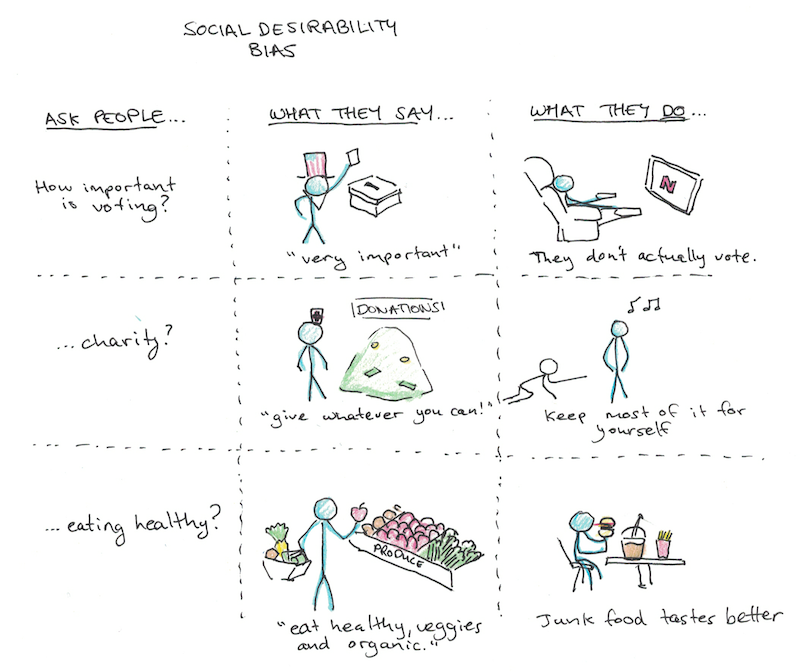In North America, we give a lot of lip-service to the idea of non-conformity being a good thing. Think outside the box. Be a rebel. Don’t be a sheep.
Except, in practice, people are extremely conformist. Think of all the things we do in, not because we thought for ourselves it was a good idea, but because society tells us to:
- Go to school, and make sure you graduate.
- Buy a house, so you don’t waste money on rent.
- Get a good job, work most of your life and then retire.
- Wear the clothes other people wear.
- Make small talk and be polite.
- Don’t speak up if you see something unacceptable, don’t draw attention to yourself.
The lip-service to rebellious free-thinking, and mythic stories of entrepreneurs, scientists and politicians who ignored the status-quo is contrasted by these overflowing examples of how conformist we all are.
Social Desirability Bias and Non-Conformity
Whenever there’s a discrepancy between what people actually do and what they say to do, beware of social desirability bias.
Social desirability bias is a psychological term for when people will advocate for options that sound good, even if their actual behavior shows they don’t really practice what they preach. If you ask people what they think about democracy, they’ll express how essential it is—and then not actually go out and vote in elections.

The standard tale about these things is that people just don’t live up to our higher ideals. Voting in elections is really important, it’s just that people are lazy.
The darker tale about these things is that when action and behavior conflict, the lip-service may not reflect how the world actually works. In practice, an individual’s vote has almost no chance on deciding an election, so the hypocrisy actually makes perverse sense.
You want to support voting, because if nobody votes (or only your political opponents do) you’ll elect bad leaders. However, since the impact of your vote is almost non-existent, the selfishly beneficial thing to do is to skip out on voting yourself.
The Social Benefits (and Private Costs) of Non-Conformity
This same analysis applies to conformity. We need to preach the value of free-thinking and rebellious invention, because these things have strong positive externalities.
Society benefits when scientists create better models of reality, rather than just publish papers and collect grants. Society benefits when innovators create new technologies, rather than just collect monopoly rents and maintain the status-quo. Society benefits when we make moral progress, and increase our sphere of cooperation.
The problem is that for each of these successful acts of non-conformity, there’s a large risk of failure. The cost of that failure is often borne personally.
The scientist who gets involved in a bizarre theory that turns out to be false is a crackpot. The inventor working on a technology that fails gets nothing for it. The moral entrepreneurs who pick the wrong sides are ridiculed at best, considered unethical deviants at worst.
Who Needs Conformity?
Rather than repeat the mantra that we need more rebellious freethinkers, and act surprised when this falls short in practice, I’d like to suggest the best way to think about it from the perspective of how it actually tends to work in practice:
- Non-conformity is good when you’re good. Meaning, being a weirdo is acceptable when you otherwise have a strong foundation of quality. Being extremely intelligent, credentialed from the best institutions, well-financed or having a track-record of success turns weirdness into eccentricities.
- Balance your strategic non-conformities with conformist compromises. If you’re going to be weird in some ways, it helps to balance that with being strategically normal in others. The more weirdness you stack on, the more you need your competing signals of quality (education, wealth, intelligence) to balance those out.
- Social skills offset your non-confomities. The more charismatic and socially successful you are, the weirder you can be before it starts to hurt you.
This perspective ignores the idealization of how society “should” work, and observe how unconventional thinkers and people tend to actually make their mark. A combination of offsetting signals about their quality, strategic non-conformity mixed with conformist compromises and charisma allows people to succeed while not doing what others expect.

 I'm a Wall Street Journal bestselling author, podcast host, computer programmer and an avid reader. Since 2006, I've published weekly essays on this website to help people like you learn and think better. My work has been featured in The New York Times, BBC, TEDx, Pocket, Business Insider and more. I don't promise I have all the answers, just a place to start.
I'm a Wall Street Journal bestselling author, podcast host, computer programmer and an avid reader. Since 2006, I've published weekly essays on this website to help people like you learn and think better. My work has been featured in The New York Times, BBC, TEDx, Pocket, Business Insider and more. I don't promise I have all the answers, just a place to start.